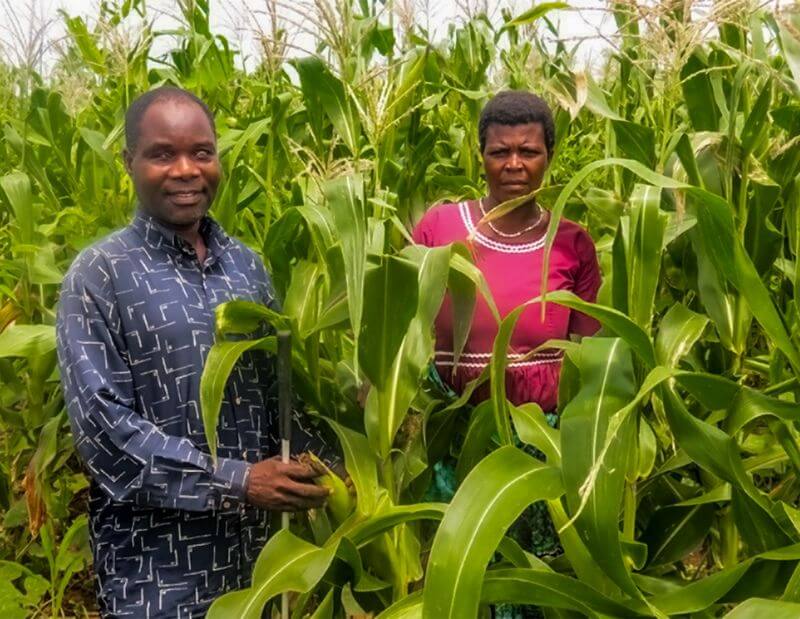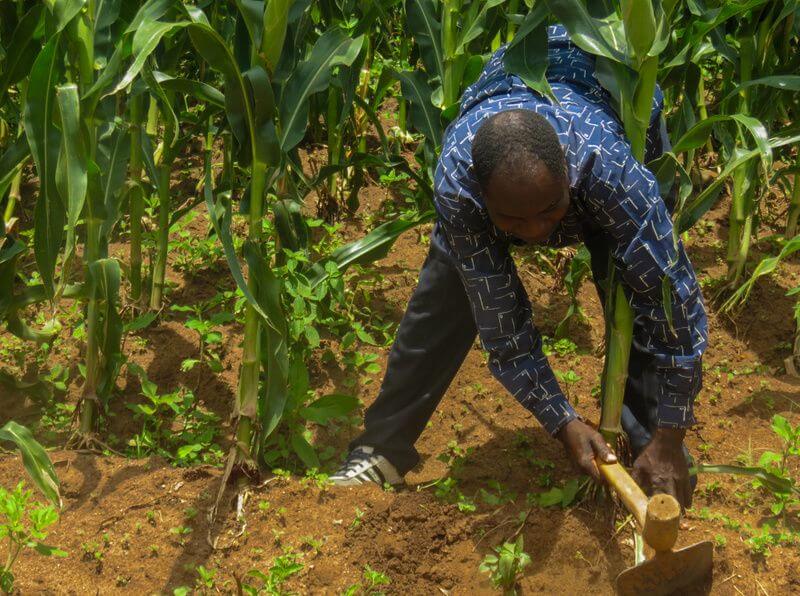Patrick Jonathan Chisale at his farm in Welemu Village in Malawi’s Southern District of Thyolo
“Yes, I am blind, but when I’m working on the farm, I do not think of myself as such”, said Patrick Jonathan Chisale, a farmer from the Welemu Village in Malawi’s Southern District of Thyolo. The 52-year-old had been farming before 2000, when he became blind. And he never allowed his condition to stop him. “Before I became blind, I loved farming. This is why even after becoming blind, I wanted to continue doing what I loved, and I also wanted to make my family food-secure”, he said. After finishing primary school and getting his high school certificate in 1996, Chisale secured a job at a tea estate.
While there, he began experiencing persistent itching in his eyes, followed by a burning sensation. “I went as far as Queen Elizabeth Central Hospital [a referral hospital] in the commercial city of Blantyre, but I failed to get relief for my eyes. The doctor told me that I would not be able to see again, and there was nothing I could do – apart from accepting my fate”, he said. Chisale then went to the Mulanje School for the Blind, to help him adapt to his new reality. Here, he learnt more farming skills. The lessons included modern farming methods, early planting, soil structure and texture and crop management.
“In addition to farming, I was most importantly trained on mobility as a blind person and also in business skills. The training took place from 1999 to 2000,” said Chisale. After leaving Mulanje, he joined a Farmer Field School (FFS) in his locality, to gain more agricultural production techniques. Chisale said at FFS, the lessons were more in-depth since they went into greater detail. “Besides my love and passion for farming, I quickly realised I would need money to buy necessities for myself and my family. Food items are easy to sell in this country. That is why I insisted on farming for commercial purposes”, he said.

Chisale currently cultivates a two-acre farm, where he grows various crops, including maise, beans, potatoes, bananas, and vegetables. “I know that several blind people beg on the streets, but this is not the decision I made. That is why I thought about farming, and I plant, weed, and harvest crops without problems”, he added. Weeding, which involves separating crops from weeds, is highly visual, but Mujale says even this does not challenge him. “This is not a problem for me because I learnt everything from Mulanje School for the Blind. I know how a number of crops feel when I touch them. I can tell almost all crops apart by hands; that’s how I weed on my farm”, he said.
Despite this feat, Chisale acknowledges that there are natural setbacks blind people have when it comes to making a living for themselves. “When you resign to your fate, nothing can move. Yes, I am blind, but that should not stop me from doing what I want. I have a family to feed and can only do that through working in the field”, he said. Besides legumes and vegetables, Chisale grows soya and pineapples, as part of the Farmer Field School (FFS) group activities. FFS is a United Nations-supported component of the Kulima Programme. It aims to build the capacity of farmers and extension workers on transformative-participatory farmer learning approaches.
Chisale is one of 30 farmers that benefitted from the programme by acquiring skills and knowledge through season-long experiential learning. FFS community-based facilitator, Evelyn Savala, describes Chisale as an example to people, who want to aim high in agricultural activities. “What he does is fantastic, an example to those who aspire to learn modern ways of farming”, said Savala, who points out that Chisale is always ready to try new techniques. “With climate change, farming is no longer business as usual. As such, farmers need to adapt by learning new farming methods, which is what Chisale is good at”. About his future plans, Chisale said his desire is to expand his farm. He also encourages other blind individuals to pursue a career in farming, assuring them that there is a steady market for their produce. Currently, however, Chisale is the only known blind farmer in Malawi.
Source: bird story agency

